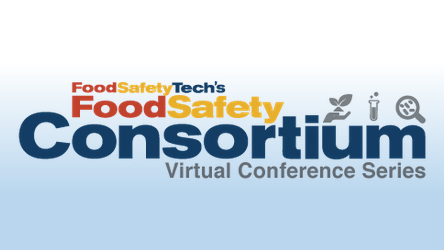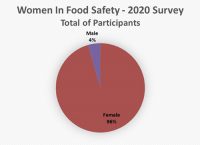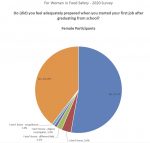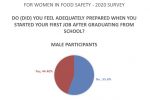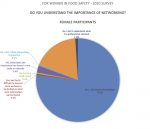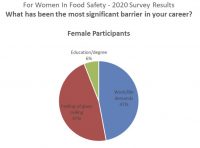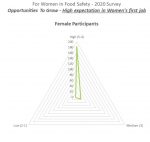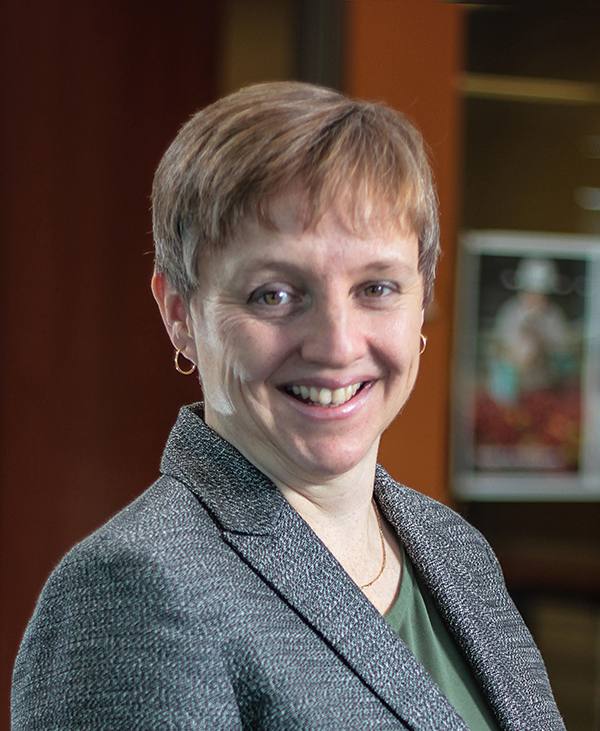We moved to Chicago five years ago. A massive city, and an epicenter of the food industry. I was at once excited and overwhelmed—afloat in a great lake of network overload. Removed from my comfort zone, I searched for ways to meet people and integrate into this new community. Upon suggestion of a trusted friend and experienced networker, I decided to try my hand at volunteering at an event hosted by the Chicago Section of the Institute of Food Technologists (IFT). That singular decision launched one of the most fulfilling journeys in both my professional and personal life. Now, five years later, I have made countless meaningful and personal connections, developed long-term relationships, and made an impact in my professional community. What started out as a way to navigate the complex circuitry of the Chicago food landscape has turned into a personal voyage for industry advocacy, leadership and contribution.
I am not alone. I have the pleasure to work and serve with colleagues around the globe that have experienced similar fulfillment by engaging with various professional organizations. Similarly, the companies that we work for reap the benefits of our involvement. Here, we will explore the value of industry engagement through the lens of the individual and the employer.
Employee Value: Top 5 Reasons to Engage
1. Professional Development – Safe Ways to Stretch Into New Roles & Skill Sets
When Pam Coleman, vice president of research services at Merieux Nutrisciences and incoming president-elect for IFT first started volunteering early in her career as a bench chemist, she found opportunities to lead groups and committees. “I developed new skills in a really safe way. As a volunteer, you can try new things, test the waters, and get relatively diverse experiences to see what you enjoy, what you don’t, and where you want to develop and explore.” The wide range of opportunities in industry organizations can offer a glimpse into future career development, or offer a learning experience that rounds out your professional repertoire. For example, joining a finance committee can stretch you outside of your comfort zone, but prepare you with skills and perspectives for future management roles. Participating on a fundraising committee can sharpen your influencing and organizational skills. Leading a technical group can offer opportunities to deep dive into a technology or discipline that can spark a passion to develop expertise in a new area. These cross-functional opportunities may not be readily available in your company, but industry organizations are always looking for professionals to volunteer.
2. Develop Your Network & Identify Mentors
Industry organizations are wrought with peers and potential mentors. Networking at events and symposiums will bring you in contact with people doing the same things as you are, facing the same challenges. You also have the opportunity to interact with the regulatory sector to learn from them. “Early in my career, my former manager built relationships with regulatory technical leaders at the USDA through industry organization involvement, and it was a great advantage for us when we ran into analytical challenges in the lab—she was able to personally call them and get suggestions and insights. They developed a rapport. This was a big lesson for me as a young volunteer. Your network can be an analytical asset.” Mentor opportunities abound as well. I have personally found that the more I engage with my organizations, the more trust I built within my network, the more mentorship opportunities naturally develop. I’ve honed valuable professional and life skills through these relationships: Conflict resolution, contract negotiations, and 501(c)3 organization creation to name just a few of the arduous tasks my organizational mentors have helped and supported me with. Building relationships across technical disciplines also holds advantage. As a microbiologist, it is fascinating to work with product developers and learn where our challenges and opportunities intersect. Not only can you network with technical peers, but also industry partners, vendors, suppliers and competitors to bring a well rounded perspective to see the industry through a truly holistic lens.
3. Gain Industry Insights
What’s new in your industry? What emerging trends are on the horizon? Engaging within industry organizations can bring keen insights well before they are published in our industry magazines and keynote presentations. Educational learning opportunities through technical committees, short courses, and symposiums can bring key advantages to giving you and your company a jump on implementing new technologies and trends. Understanding regulatory changes, implications, and perhaps most important, insights on how regulators will interpret and enact changes can also be gleaned from organization engagement. You can also gain exposure and experience with new business models such as zero-based budgeting and account-based marketing, which can lead to additional opportunities and advantage for you and your company.
4. Create Your Personal Brand
Who are you in the Industry? What do you want to be known for? Through industry engagement you can develop your personal brand and carry that image into your career. Do you strive to be a facilitator and connector? Run for a leadership position. Do you want to be known as a technical leader and subject matter expert? Lead a technical committee or task force. Do you want to be seen as a reliable contributor? Offer to develop content for a technical newsletter, or volunteer for a marketing committee. Not sure what you want your personal brand to look like? Try multiple roles and opportunities to see what inspires and fulfills you, and then pursue that with gusto. “When I look back and think, ‘How did I go from a bench chemist to this?'”, reflects Coleman, “I am certain I wouldn’t be where I am in my career today if it weren’t for my experiences and opportunities in organizations like IFT.”
5. Personal Fulfillment – Increased Health & Happiness
Industry advocacy and engagement can bring an immense sense of personal fulfillment, especially when you are able to make a contribution and an impact to the organization. Not only that, it can make you feel better, too: A 2010 United healthcare/VolunteerMatch (UHVM) study found that volunteering has a positive influence on physical and emotional health. One of the common objections to engaged volunteering is time, or lack of it. However, the University of Pennsylvania’s Wharton School recently found that those who volunteer not only feel more accomplished, but they also found they could do even more, as “giving your time to others can make you feel more ‘time affluent’ and less time-constrained”. In the words of my trusted networker friend that set me off on my volunteering journey five years ago: “The more you do, the more you can do.”
Quick TIPS:
- Be Clear on Your Time: No matter how many or few hours you can devote, be upfront with the organization about how much time you can commit and what your goals are.
- Think Local: Don’t forget your regional sections and chapters. Your organization(s) of choice also may have specialty groups and divisions that match your expertise or an area you may want to explore.
- Get Out of the Booth: For those of us accustomed to working the trade show floor, challenge yourself to one meeting a year where you are there to learn. Get out of the booth. Absorb technical insights and trends. Bring back your learnings to your team and help connect the dots.
Employer Value: Top 5 Reasons to Support Engagement
1. Gain Company Influence & Visibility
Paid sponsorship opportunities are always available (and appreciated) but are often limited to financial contribution, and the benefit of company logo and online web banner opportunities. Real value is in visibility of your brand through your people. Supporting your employees to lead and engage puts your brands’ voice in a position of influence and contribution. Imagine if your company could influence industry guidance on topics that matter most to your brand? Encouraging your employees to lead in trade and technical organizations puts them in a position to do just that.
2. Customer & Industry Insights
Engagement in industry organizations also brings ‘boot- on-the-ground’ insights on the voice and needs of your customers. This is where you will find what the real emerging needs and challenges are in our B2B world. Dave Goins, COO of Q Laboratories and a leading proponent of employee contribution to technical organizations agrees. “A key benefit Q Laboratories enjoys [of our scientists involvement]I s they get to ‘complete the picture’ when it comes to the importance to our clients on the testing we do for them, and the reasons why we approach our analytical business the way we do.” Instead of only relying on analytics, market trend reports, and legacy industry assumptions—encouraging your people to get out from behind their desks, or off the bench, and engaging with the customers and market directly will not only provide insight on their present needs, but can also give a peek into the proverbial crystal ball of needs to come and give your company a competitive edge.
3. Leadership Creation & Development
“Our employees gain valuable confirmation at these meetings” reflects Goins, “and as a result of their engagement and contributions we see careers, development and advancement accelerate for these individuals within Q Laboratories.” Putting forth employees to engage in industry organizations in leadership roles can help them develop from good to great. Not only does this provide leadership cultivation, but also opportunities to develop technical competencies at a more rapid pace with shared resources. Employees can hone soft skills too, such as emotional intelligence, conflict resolution, negotiation and collaborative skills that they will bring back to work.
4. Learn from the Industry & Contribute to Problem Solving
Industry engagement, especially from a technical perspective, allows your company and your people to collaborate and learn from others successes and mistakes. “Our people have the added benefit of having the opportunity to share experience and ideas with other highly qualified individuals who often face the same challenges our teams face every day,” says Goins. Your team can build on those insights to ensure your company’s continued success. Engagement also provides opportunity for your company to present itself as a market leader in setting policy and launching innovative solutions. With the right idea, the right platform, and the right audience, your company could be poised to be the champion and realize the success of the next “blockchain-like” revolution.
5. Your Competitors are Doing It
It goes without saying that we are all looking for that competitive edge, the premium exposure, and the increased market share for our brand and solutions. As industry organizations are recruiting members, volunteers and leaders, they are seeking engaged individuals who want to contribute and champion the organizations mission and vision. If it isn’t your people filling those roles, it will be your competition’s people. Your competitors will learn and connect in deep, meaningful ways and build relationships with your current and prospective customers. Research also shows that companies that encourage volunteering enjoy increased employee loyalty and increased employee retention. Bottom line: Supporting Industry organizations through employee engagement is good for your people, and good for business.
Quick TIPS:
- Invest & Incentivize Engagement: Pay for memberships and meetings, and reward employee leadership and participation on committees, working groups and elected positions.
- Formalize a Program: Partner with key industry organizations to create an ambassador program within your company to share happenings and opportunities. In the end, you will have a powerful group of engaged employees in various organizations making an impact and championing your brand.
- Think Outside of the Lab: While encouraging technical employees to engage, also consider the less obvious team members to get involved: Sales, marketing, human resources, finance and executive-level teams. Often, industry organizations suffer from monoculture challenges and can use expertise from other professional backgrounds to improve. As a result, your team will gain exponential insights, influence and opportunities.

